You've successfully copied this link.
Juwai reveals top 10 Chinese buyer picks for 2016
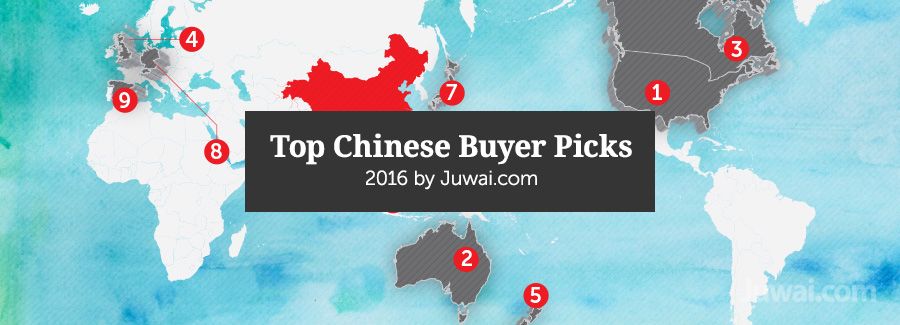
Where were Chinese property investors looking to buy in 2016?
 Propelled by rising property prices in China’s domestic property market, burgeoning retirement planning boom with China’s silver generation, and the fact that property is still the most preferred asset class for Chinese, Chinese appetite for overseas property remained undaunted by myriad cooling measures and restrictions imposed by various markets last year.
Propelled by rising property prices in China’s domestic property market, burgeoning retirement planning boom with China’s silver generation, and the fact that property is still the most preferred asset class for Chinese, Chinese appetite for overseas property remained undaunted by myriad cooling measures and restrictions imposed by various markets last year.
We share the top 10 countries and cities most in demand with Chinese real estate buyers on Juwai.com in 2016, and take a closer look at recent trends that drove Chinese property investors to the following locations.
Top 10 hottest countries for Chinese buyers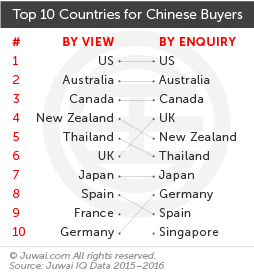
The US continued its reign as the most viewed and enquired investment destination by Chinese buyers on Juwai.com last year.
And while Australia, Canada, and Japan held a solid grip on their respective spots, it’s riveting to note how the other countries had varying positions on both lists. One clear example is the UK, which ranked sixth in terms of views yet placed fourth in terms of Chinese buyer enquiries.
France, which was the ninth most viewed country by Chinese homebuyers, didn’t even make the cut on the second list. Instead, it was Singapore that crept into the list to become the tenth most enquired country last year.
Find out why Chinese enquiries tend to differ from their initial searches here.
Top 10 most-viewed cities by Chinese
We break it down further, and offer a closer look at the ten cities most viewed by Chinese homebuyers in the following countries.
United States (US)
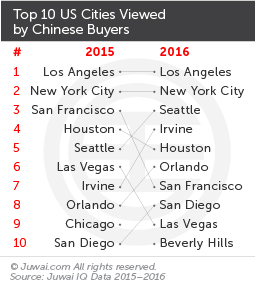 Despite being faced with the prospects of a Trump presidency during the last few months of 2016, the Chinese love for the US stayed true.
Despite being faced with the prospects of a Trump presidency during the last few months of 2016, the Chinese love for the US stayed true.
Chinese buyer enquiries for US real estate on Juwai.com were up 178% y-o-y in the final weeks of 2016.
In terms of popularity, Los Angeles (LA) and New York City (NYC) remained unchanged as the two most sought-after cities in the US, while third-placed Seattle can thank the British Columbia foreign buyer tax for its latest surge in popularity with Chinese, as reported by Bloomberg.
The implementation of the new 15% foreign buyer tax in August 2016 saw Chinese buyer enquiries increasing 66% y-o-y for Seattle, even as it fell 43.4% in Vancouver during the second half of 2016.
The biggest climber was Irvine, which is home already to a huge Chinese community – 17% of Irvine’s population are Chinese2, and Irvine has now become the largest city in the continental US with an Asian plurality.3
Despite the ambivalence encircling Trump’s travel ban, we believe the US will hold steady in the hearts of Chinese homebuyers in 2017, as many Chinese are still chasing after the American Dream, and the US is still extremely popular with Chinese students1 – 34% of China’s high net worth population consider the US as the #1 education destination1, and 72.6% of Chinese buyers on Juwai.com cited education as their chief motivation for buying in the US in 2016.4
Australia
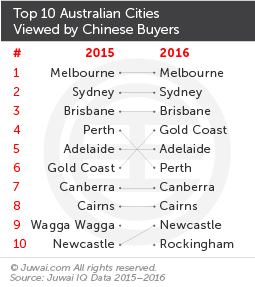 Sitting tight at #2, Australia stayed ever much in demand with Chinese buyers last year, who seemed unfazed by lending restrictions, new stamp duty, and land tax surcharges on foreign buyers in parts of Australia.
Sitting tight at #2, Australia stayed ever much in demand with Chinese buyers last year, who seemed unfazed by lending restrictions, new stamp duty, and land tax surcharges on foreign buyers in parts of Australia.
Juwai IQ Data revealed that Chinese enquiries for Australian properties priced up to $1 million were up 34% in September, compared to 12% in June, as reported by Reuters.
Another reason behind such healthy demand from Chinese was due to an emerging trend last year, which saw the rise of the Chinese ‘Upgraders’ – Chinese Australians who are increasingly choosing to upgrade from apartments to house and land packages.
This new trend is mostly driven by the first wave of Chinese buyers in Australia, who first bought apartments during their student days. However, most have now married and settled down, and like most Australians, many now seek a larger home with land as they move on to their next phase in life.
New Australian student visa rules, which went into effect on 1 July 2016, further fuelled Chinese investment in the Australian property market, particularly as 52% of Chinese property hunters prefer to invest in school districts, compared to 23% in CBD, and 17% in areas close to Chinese communities.6
As for where Chinese are looking, Melbourne – voted the most liveable city in the world5 – led the pack, followed by Sydney and Brisbane as the three most-searched cities in Australia. Elsewhere, Gold Coast experienced a resurgence in popularity, while Rockingham made its debut into the top 10 for the first time.
Canada
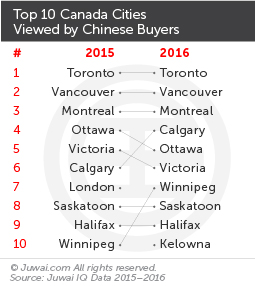 Even the furor surrounding the new foreign buyer taxes in British Columbia (BC) was unable to oust Canada from its third spot on the list.
Even the furor surrounding the new foreign buyer taxes in British Columbia (BC) was unable to oust Canada from its third spot on the list.
After all, Canadian real estate is still considered a bargain by Chinese property buyers, and Canada remains the third favourite emigration destination for China’s rich and wealthy6, thanks to it being one of the best places in the world to live in.
Canada is home to three of the ten most liveable cities in the world: Vancouver (#3), Toronto (#4), and Calgary (#5), according to the Global Liveability Ranking 2016 by The Economist Intelligence Unit.5
While the 15% foreign buyer tax may have led some Chinese homebuyers towards Seattle, other Canadian cities saw significant increase in Chinese buyer attention on Juwai.com as well.
Nevertheless, Vancouver still remained as the second most viewed city in Canada, behind #1 Toronto and ahead of #3 Montreal. Two other Canadian cities that also received a surge in Chinese searches were Calgary, which saw a significant increase in Chinese enquiries on Juwai.com during 1H 2016, and Winnipeg.
With a Toronto councillor renewing calls to follow the footsteps of British Columbia in imposing a foreign buyer tax in the Greater Toronto Area (GTA)7, how would these rankings change in the next quarter? Either way, regardless of where they’re looking at, Canada looks set to stay hot in demand with Chinese property buyers.
This rings true, considering education is a strong motivation driving Chinese real estate buyers abroad, and Canada recently overtook Australia to become the third most favoured education destination for Chinese HNWIs.1 This, together with the fact that more and more direct air links – such as the Hainan Airline’s new direct air link between Calgary and Beijing – continue to be added between various cities in China and Canada is likely to propel more Chinese towards Canada in the coming years.8
United Kingdom (UK)
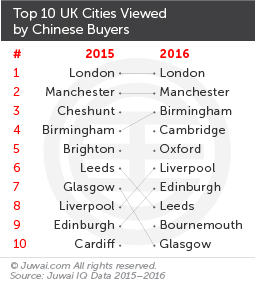 Already acclaimed as a safe haven, UK’s popularity with Chinese saw a huge spike on the back of the post-Brexit depreciation of the British pound, which made UK properties a bargain buy in the eyes of Chinese homebuyers.
Already acclaimed as a safe haven, UK’s popularity with Chinese saw a huge spike on the back of the post-Brexit depreciation of the British pound, which made UK properties a bargain buy in the eyes of Chinese homebuyers.
Chinese buyer enquiries surged 40% on Juwai.com in the month following the Brexit referendum.
While London still dominated as the top choice for Chinese property hunters last year, its increase in stamp duty of 8% for property worth over £250,000 has led many Chinese to look towards the North, particularly at Manchester.
Chinese enquiries for Manchester were up 53.8% y-o-y on Juwai.com in November 2016, and we can see why. With the completion of the HS2 High-speed Railway extension to Manchester, which makes it just 59 minutes away from London Euston instead of 2.5 hours9, as well as the newly-added Beijing-Manchester direct flight from Hainan Airlines, which is set to attract over 20,000 Chinese and generate a revenue of £250 million for the UK economy by 202610, 2017 could be the year for Manchester as more Chinese continue eyeing other UK cities as an alternative investment location offering better returns and yields than London.
Besides Manchester, other UK cities that savoured a boost in Chinese attention last year include Birmingham, Liverpool, and Edinburgh. Interestingly, two other notable UK cities that came out of nowhere to take the fifth and sixth spot were Cambridge and Oxford – home to the famed Cambridge and Oxford Universities.
Was this a coincidence? We say no. Seeing as 20% of Chinese high net worth individuals (HNWIs) voted the UK as the second most preferred destination for their children’s overseas education1, it’s definitely imperative to take into account how Chinese are highly motivated by education.
New Zealand
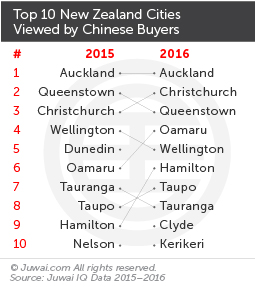 The Kiwi government’s move in January 2016 to loosen visa policies on multiple entry visas, offer longer business visas, and extend validities saw New Zealand reaping the benefits for the rest of the year.
The Kiwi government’s move in January 2016 to loosen visa policies on multiple entry visas, offer longer business visas, and extend validities saw New Zealand reaping the benefits for the rest of the year.
409,008 Chinese visited New Zealand in 2016, a 14.9% growth11 that trickled over into the property market.
Chinese visitors to New Zealand increased 24% y-o-y by the end of September 201612, the same period that saw Chinese enquiries for New Zealand property grow 50% on Juwai.com.
By October, total Chinese enquiries and views for New Zealand on Juwai.com were up 80% and 127%, respectively, y-o-y.
With New Zealand becoming an emerging location increasingly favoured by Chinese, where were they eyeing in New Zealand last year?
Besides Auckland, which stayed firm at the top spot, all the other Kiwi cities either saw a change in ranks, or were replaced by other cities. Biggest climbers of last year were Hamilton and Oamaru, while Dunedin and Nelson dropped off the list entirely to be replaced by the cities of Clyde and Kerikeri.
Europe (excluding UK)
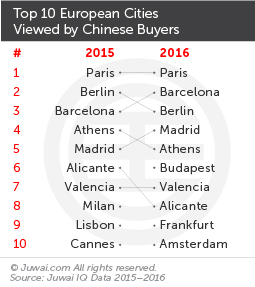 With the euro still weak against the Chinese yuan, Europe continued to be of interest for Chinese investors last year.
With the euro still weak against the Chinese yuan, Europe continued to be of interest for Chinese investors last year.
Surprisingly, despite the terror attacks in France last year, Paris stayed as Chinese buyer's most-searched city in Europe for 2016. However, France still slipped out of the top 10 list in terms of Chinese buyer enquiries last year, as seen above.
Barcelona and Berlin saw no changes from 2015 as well, and remained in the top three, albeit having swapped positions.
Elsewhere in Europe, we also saw newer alternative markets, like Budapest in Hungary and Amsterdam in the Netherlands emerge in 2016.
Still, it was clear to see that Spain was the star in Europe that enjoyed the biggest boost in popularity with Chinese last year – both Barcelona and Madrid moved up in ranks, and Valencia stayed steady at the seventh spot, while only Alicante saw a slight wane in Chinese interest.
That said, where would Chinese buyers be looking at this 2017? Stay tuned, and we’ll keep you posted in our next quarterly update.
Sources: 1. Hurun Report “Chinese Luxury Consumer Survey 2017”; 2. The Orange Country Register: Political candidates appeal to Irvine’s growing Chinese population; 3. The Orange County Register: Why Asians have become the dominant group in Irvine – and what that means for the city; 4. Juwai IQ Data, November 2016; 5. The Economist Intelligence Unit “A Summary of the Liveability Ranking and Overview” Report; 6. Hurun Report “Immigration and Chinese HNWI 2016”; 7. CBC News: Toronto councillor renews calls for foreign buyer tax; 8. Calgary Herald: B.C. tax could drive more Chinese buyers to Calgary, realtors say; 9. BBC: Chinese property investors bet on the Northern Powerhouse; 10. Gentlemen in China: More Chinese tourists going to Manchester; 11. Global Times: Overseas visitors come in record numbers to New Zealand; 12. COTRI: Newly-published government statistics show just how important Chinese outbound tourism has become to New Zealand’s economy;
Liked this article? Sign up for free to get Juwai Juwai Asia Market updates!
2025 © Juwai. All Rights Reserved Privacy Policy | Terms of Service


